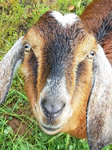


You can put the mower and the chemicals away now. There’s a new weapon in the fight against weeds and brush, and this one fertilizes the ground and provides lively entertainment to boot.
Goats have become a popular tool for municipalities, transportation agencies and neighborhoods, who need to manage overgrowth of weeds in hard-to-reach places.
Goats are browsers and typically prefer brush and broad-leafed, non-grassy plants — often referred to as weeds. Research shows that goats will choose forbs or woody plants 85 percent of the time over grasses, which makes them a hard-working, sustainable method of weed control.
Goats like to nibble a little here and there from several different plants, which allows them to get the nutrients they need while avoiding poisoning from toxic plants. Since they like variety, don’t expect goats to clean up a single unwanted plant species.
Goats can improve pasture in several ways. By grazing noxious weeds, they reduce the viable seeds that would otherwise reproduce year after year. Weeds shade out desirable grasses, and controlling weed growth allows grass to prosper. Goats produce manure as they mow, and gently work it into the soil with small hooves which don’t damage the ground.
“Goats are a natural recycling resource,” emphasized Tracy Nichols of NW Love All Animal Rescue in Battle Ground.
Nichols offers “loaner” goats to help control weeds and brush on area properties.
The requirements to borrow a goat are pretty simple. They are sent out in pairs only, since they are social animals. They need shelter; trees will do, or Nichols will provide a portable shelter. And they’ll need a source of fresh water.
The minimum property size to keep a pair of goats (or more) is about ¼ acre, said Nichols. “They’ll have that chewed down in one to two weeks.”
All of the goats have been socialized and trained to lead, so they can be handled and moved easily. Some of them have horns, but no goat is sent out that has used its horns on people, said Nichols.
If the destination is in an outlying area where predators are likely, Nichols would send larger goats. In addition, the rescue has llamas, alpacas and miniature donkeys which can accompany the goats to act as guard animals.
Goats are notorious for their escape artistry, so goat-safe fencing is needed. Possible enclosures might be cyclone fencing, field fence, or wood rails with a hot wire attached. In some cases, Nichols has materials available to adapt fencing for goats headed to long-term homes.
Some goat-keepers recommend creating a “goat mower,” a movable corral of goat-proof 4 foot by 16 foot mesh panels. They are lightweight and can be joined at the corners in a variety of ways — wire or baling twine are common make-do solutions. The corral can be easily moved to a fresh area of brush every few days.
“We’re open to doing this for all pasture animals,” said Nichols.
Other grazing animals can be delivered to a temporary home to control grass and weeds.
Some of the weed-eating goats are rescued animals who will live on the farm’s animal sanctuary, others are available for adoption, and some are Nichols’ personal pets.
When a goat is working “on location,” Nichols will continue to provide hoof and veterinary care for the animals.
The goats are so popular that Nichols actually has to seek them out. They are part of the work crew on her own farm, pastured alongside grass-lovers like cattle and horses.
“I’m always looking for goats,” she said. “I like to have 10 or 15 on hand.”
And goats are just enjoyable to have around.
“I like them because they are fun and entertaining, like dogs,” said Nichols.
There is no charge to borrow a goat. Nichols considered following the practices of other “goat rental” businesses, but then she decided, “Nope, I’m just going to go ahead and help the community,” she said. Donations are always welcome, though.